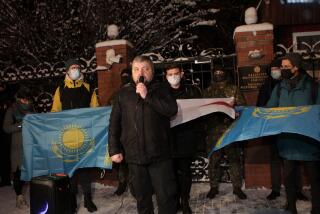COLUMN LEFT : Walesa Should Look Twice at His Blessings : What IMF austerity measures have wrought in Latin America is a stark example for Poland.
Lech Walesa came to visit this month and left with a glow on his cheeks. While the leaders of other poor countries have pounded their fists impotently on the doors of Western governments and lending institutions, Walesa went away celebrating a double dose of preferential treatment.
First, on March 15, the so-called Paris Club of creditor nations forgave half of Polandâs $33-billion debt to Western governments. This is the most generous treatment ever accorded a debtor nation. The United States had favored even more indulgent terms, and when Walesa came to Washington four days later, the Bush Administration wiped the slate clean on 70% of Polandâs $3.5-billion U.S. debt.
Even the worst basket-case economies of Africa have never had their debt reduced by more than one-third. Nor have impoverished Latin American governments, which incurred their huge debt burdens in the 1970s and early 1980s, when Western bankers had billions of petrodollars to throw at any general who said he needed them. Only Egypt has encountered comparable Western generosity; its $7.1-billion debt to the United States for weapons purchases was written off as a simple quid pro quo for its Iraq policy.
More than simple altruism is at work in the Polish case, too. U.S. officials point to the exceptional nature of Polandâs transition to a market economy. Roughly translated, this means that Poland is unique in how far it will go to prostrate itself before the dogmas of Western economists and the International Monetary Fund.
The first stage of Polandâs new debt relief program will take effect only when it signs an agreement with the IMF, promising the large-scale privatization of its economy and a set of austerity measures to slash public spending and curb inflation. A second round of help will come only when Poland demonstrates that it has indeed been obedient to the IMFâs dictates.
It probably seems churlish--not to mention out of step with the tide of history--to suggest that Walesa think twice about the blessings of the IMF. A decade of the fundâs austerity programs, for example, have had about the same effect on Latin America as the U.S. Air Force did on Iraq, reducing per-capita incomes to 1976 levels.
And the Poles, remember, are supposed to be the lucky ones. Even starker signs of impending collapse come from what used to be the German Democratic Republic, whose experience suggests that Western promises of economic rebirth are not worth the paper they are printed on. Even the president of the German central bank says that the last year has been âa disaster.â Industrial output has shrunk to less than half of what it was a year ago, while unemployment and forced underemployment affect 40% of eastern Germanyâs workforce.
The reasons are not hard to discern. Western industry is interested in the East only as a new consumer market, not as a location for productive investment. Western banks are eager to get their paws on East Germansâ savings, less so to lend them money for new enterprises. A year ago Chancellor Helmut Kohl made the absurd promise that no German would be worse off after reunification. Last month, tens of thousands of protesters marched in Leipzig, cradle of the 1989 revolution, with banners calling him âpigâ and âliar.â
There were no American television cameras there, of course, any more than there are these days in Bucharest or Prague. Reality, as the Rodney King beating indicates, is only what happens on TV, and what that meant to Americans was Lech Walesa on the south lawn of the White House. Walesa speaks no English, but he ended his remarks with the words âGod bless America.â George Bush was heard to reply, âBeautiful, thank you, how sweet.â Those who tell us what we want to hear reap the rewards, however dubious.
Eastern Europeans have good reason to question the motives of Western leftists who now point to the regionâs predictable miseries and cry âtold you so.â One honorable exception is the New York-based Campaign for Peace and Democracy, which has the moral capital to offer Eastern Europeans constructive criticism after years of support for their silent struggles. The campaign now suggests an alternative economic approach based on unconditional debt relief, direct Western government aid rather than reliance on private investment, the continued value of central planning for social needs and limits on privatization of large state enterprises. These are sensible proposals, but is there anyone in the political mainstream--East or West--who will heed them?
More to Read
Sign up for Essential California
The most important California stories and recommendations in your inbox every morning.
You may occasionally receive promotional content from the Los Angeles Times.










